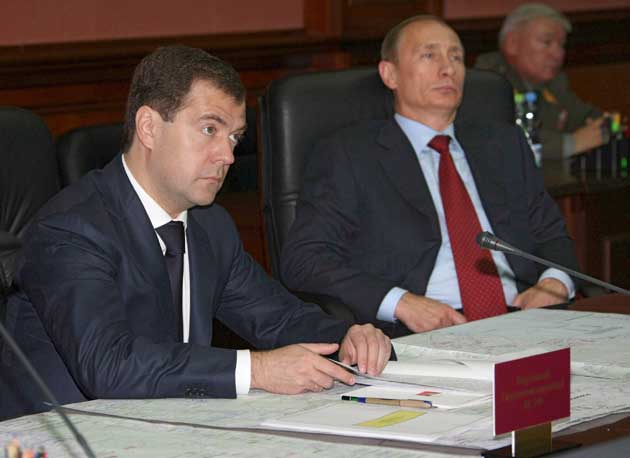Russian leadership: Putin in his element as successor is left in back seat

As the Georgian conflict has widened, the Russian President, Dmitry Medvedev, has looked positively uncomfortable in his public appearances since last Friday. Not so his Prime Minister, Vladimir Putin, the architect of the Chechnya war, who is clearly back in the driving seat – if he ever vacated it.
Mr Putin was seated only a few feet from George Bush at Friday's lavish opening ceremony of the Olympic Games in Beijing, while the Russian Prime Minister's boss was minding the shop in Moscow.
Wearing a red and white striped tie, the jacketless Mr Putin – a judo black belt – leapt to his feet to salute the Russian athletics team as they entered the Bird's Nest stadium. The next day, he was back on television as he bounded from a transport plane wearing jeans and a casual jacket to visit the wounded at a field hospital in North Ossetia. While in southern Russia, the former president spoke with the refugees who had fled the Georgian onslaught in Georgia's breakaway enclave of South Ossetia, denouncing Georgian "crimes against its own people".
Before he left Beijing, he had met President George Bush, who warned Russia that the violence against Georgia, which was raging as the two watched the Olympics spectacle, was "unacceptable." The two leaders spoke again that evening. It looked like business as usual for Mr Putin, who left the presidency to his hand-picked successor, Dmitry Medvedev in May. Mr Medvedev, the former head of the state-owned giant Gazprom, has been in Mr Putin's shadow ever since.
Even before his departure for Beijing, Mr Putin had upstaged Mr Medvedev by taking the lead in official reactions after the death of Alexander Solzhenitsyn.
During a meeting with the Prime Minister at the President's Gorky residence near Moscow on Saturday, Mr Medvedev could be seen on TV leaning back in his green leather armchair while Mr Putin explained assertively what was to be done following his return from North Ossetia. He only got to speak to President Bush on Saturday night. At a meeting with Russian politicians in the Kremlin yesterday, an unflattering photograph of the diminutive 42-year old President showed him dwarfed by two of his guests.
Mr Putin had been expected to engage in "some hand-holding" with Mr Medvedev before taking a back seat, said Russia expert Michael Denison, an analyst with the think tank Chatham House. But "Putin's high profile appears to show the outside world that Medvedev is a ceremonial president. Putin is the dominant player," Dr Denison said. According to a recent Russian survey, 36 per cent of Russians believe that Mr Putin is still in charge after eight years as president, with 6 per cent believing it is Mr Medvedev.
The prime minister of Russia has traditionally taken care of economic matters. But Mr Putin continues to be deeply involved in the country's foreign policy, and seems to delight in having his picture taken with "hard men" in the military. Yesterday, he was present at a meeting between the President, the defence minister and army chief of staff in the Kremlin. "He appears to be stepping beyond his traditional remit," said Dr Denison, a lecturer at Leeds university.
However there have already been tensions between the two camps since May. Mr Putin wiped almost $60bn (£31bn) off the stock market at the end of last month when he criticised Russian energy company Mechel for abusing its position and over-charging, driving Mechel's stock price sharply down. One of Mr Medvedev's advisers, Igor Yurgens, commented that it was inappropriate to "destroy your own stock market... and wipe off $60 billion."
Mr Medvedev's entourage was swift to scotch talk of a rift between the leaders, but it left the lingering impression that the former lawyer was not happy to be confined in a subordinate role.
When the President has spoken out on foreign policy, he has stuck to the Kremlin line. Last month, he warned that the Western-backed independence of the former Serbian province of Kosovo was "extremely dangerous". It is widely held that Moscow's opposition to Kosovo's independence is partly responsible for the current conflict with Georgia.
It could be that the President and the Prime Minister are working in tandem. But this seems unlikely. "The problem is that dual power systems don't work, they are not effective in the longer term," said Dr Denison.
Subscribe to Independent Premium to bookmark this article
Want to bookmark your favourite articles and stories to read or reference later? Start your Independent Premium subscription today.

Join our commenting forum
Join thought-provoking conversations, follow other Independent readers and see their replies